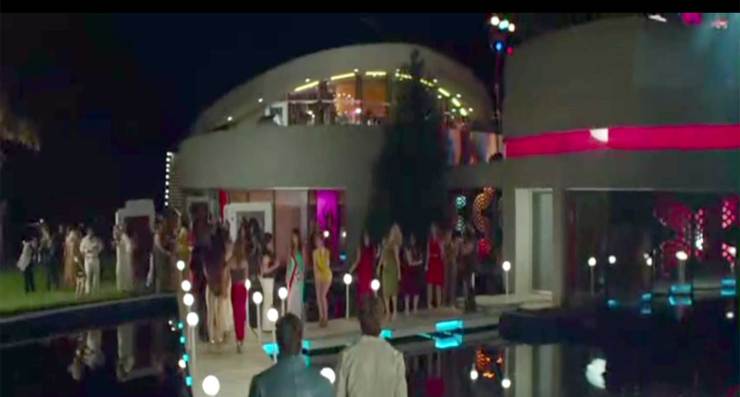Disco movies – 70s disco and club culture on film
Disco movies have so far proved to be an all-too small sub-genre of cinema. Here’s a selection of our favourites, taking in a couple of the obvious ones and throwing in one or two you may not have heard of. They’re all great in their own, sometimes eccentric ways although 54 in particular was panned on its release – possibly down to production company Miramax insisting on their own edit at the time. As ever, if you’d like to experience classic disco on the dancefloor for yourself, there’s Lost In Disco on September 15th.
Saturday Night Fever (John Badham, 1977)
Famously adapted from Nik Cohn’s New York magazine article that Cohn later acknowledged was fabricated. This enormously successful film spawned millions of tacky fancy dress costumes and helped push disco firmly into the mainstream which was for a time its undoing. Despite that it’s a tremendous movie; far darker than many remember with Travolta and Karen Lynn Gorney both brilliant in the lead roles, and of course that iconic soundtrack.
Thank God It’s Friday (Robert Klane, 1978)
Thank God It’s Friday was a co-production between Motown and Casablanca records, and features two of those labels’ biggest stars of the time, The Commodores and Donna Summer. It’s a semi-comic tale set around fictional LA nightclub The Zoo, and stars Jeff Goldblum and Debra Winger. ‘Last Dance’, Donna Summer’s big number in the film, went on to win the Academy Award for best song.
The Stud (Quentin Masters, 1978)
A seedy, trashy depiction of the goings on around a ‘Tramp’ style nightclub in London, based of course on Jackie Collins’ novel and starring 70s icons Joan Collins and Oliver Tobias. It’s all very soapy and very British, but with a soundtrack including the likes of Odyssey, Rose Royce, Baccara and Hot Chocolate. Joan followed this up with sequel ‘The Bitch’ and famously ‘Dynasty’, although Oliver Tobias never quite maintained this level of fame.
The Last Days of Disco (Whit Stillman, 1998)
Whit Stillman’s film made stars of Chloe Sevigny and Kate Beckinsale. It’s entertainingly talky and philosophical as his movies tend to be, and centres on an unlikely group of WASPy twenty somethings who frequent a Studio 54 type club in 1980, as disco approaches its decline.
Whit Stillman and Kate Beckinsale were recently interviewed in The Guardian about the production for its 20th anniversary.
Disco Godfather (J. Robert Wagoner, 1979)
“We are gonna attack the wack.”
A terrifically terrible vehicle for Rudy Ray Moore, Disco Godfather is a late-era Blaxploitation flick with its tongue firmly in cheek (well, occasionally). Moore plays a former cop, now a nightclub owner/superstar DJ who sets out on a mission to clean up the neighbourhood of PCP dealers. Blaxploitation staples crooked politicians, dodgy cops and huge collars join the terrible fight scenes, although the designer of Rudy Ray Moore’s wardrobe deserved every award going.
54 (Mark Christopher, 1998)
A highly fictionalised account of height and fall of Studio 54 this aimed to be the king of disco movies but fell short somewhere along the way. 54 is told through the eyes of the bartenders and bit players, with Mike Myers playing Steve Rubell and a cast that includes Salma Hayek, Neve Campbell and Ryan Philippe. As should be expected, the soundtrack is on point, with a good blend of the obvious big hits with some more thoughtfully chosen numbers.
The Bitch (Gerry O’Hara, 1979)
“She’s still in the disco business – just…”
The follow up to The Stud retained Joan Collins and many of the supporting cast, and added a transatlantic gangster element, possibly inspired by The Long Good Friday. That supporting cast are all faces known from British TV and add to the sense of a hastily thrown-together sequel to a surprise hit. It’s still sleazily enjoyable, but like ‘The Stud’, has a very white cast for a film full of black music.
Disco 9000 (D’Urville Martin, 1977)
“The movie that moves in your grooves!”
Another wonderful Blaxploitation effort, with nightclub owner Fass Black (John Poole) being leant on by big business in the form of a record label run by the crooked Bellamy. Typical of low budget movies of the genre are the wildly mismatched shots in the club and no attempt at syncing the music with the dancing, but it’s a hugely entertaining time capsule.
Special mention goes to:
The Nice Guys (Shane Black, 2016)
Not a disco movie as such, but The Nice Guys is set in 1977 Los Angeles and has a long sequence set in an amazing house party. A masterpiece of styling and interior design, it even has Earth Wind & Fire playing live on one of the terraces. It’s the kind of party you definitely would want to have been at.


